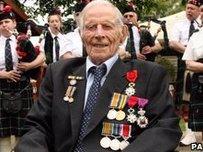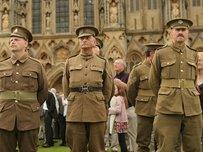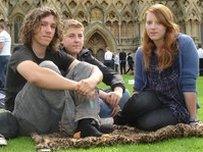Patch funeral 'end of generation'
- Published

Harry Patch fought at the Battle of Passchendaele in World War I
The funeral of the last British survivor of the World War I trenches, Harry Patch, has taken place. It marked the end of a generation of soldiers who fought a very different kind of war to those in Afghanistan.
Thousands of spectators lined the streets of Wells in Somerset as Harry Patch's coffin was taken to the cathedral where the service was relayed on big screens to crowds outside.
At the end of the funeral service two bugles sounded the Last Post.
So far, the bodies of nearly 200 dead British servicemen have been flown home from Afghanistan.
Each time they are brought back, it is headline news and a tragedy for their families.
When Harry Patch passed away last month, at the age of 111, the world lost its last living link to the horrors of the World War I trenches.
In just four years - between 1914 and 1918 - more than a million soldiers and servicemen from Britain and the British Empire were killed.
Like those that have died in Afghanistan, most of them were young men in their teens or early 20s.
In 1916, at the Battle of the Somme, 20,000 British troops were killed in a single day.
In Afghanistan, most British deaths lately have been because of remotely-detonated Taliban bombs.
At the Somme, tens of thousands of men fought face-to-face, with guns, grenades, bayonets, and their own bloody hands.
Others were cut down by machine gun-fire as they walked or ran towards German lines.
It was the bloodiest 24 hours in the history of the British Army.
'Last of a generation'
Harry Patch wasn't at the Somme - but he was at Passchendaele a year later. It lasted for months, and it was one of the toughest, most gruelling battles of the war.
Speaking much later, he recalled the fighting there as, "mud, mud and more mud mixed together with blood".

Men dressed as World War I soldiers outside Wells Cathedral
Men and horses drowned on the battlefield.
Death was all around Harry, but he made a pact with his mates that they would try not to kill anyone themselves if they could help it.
On 22nd September 1917, a German missile burst over the heads of Harry and four of those mates.
Three of them died.
Harry survived - but he spent 12 months in hospital with a shrapnel wound. He was still recovering on the Isle of Wight when the war ended.
Ninty-two years later, Harry's family and friends were joined at his funeral by government ministers and army chiefs.
Speaking during the service the Very Reverend John Clarke, Dean of Wells said: "Harry was an ordinary Somerset man, a plumber who tended his vegetable gardens, looked after his chickens but he became extraordinary, someone who was an icon for our nation and for western Europe."
The Queen said recently she was "saddened" to hear of his death and she "will never forget the bravery and enormous sacrifice of his generation".
It was a sentiment echoed by Prime Minister Gordon Brown: "Harry was the last of a generation of heroes ... I share his family's grief at the passing of a great man."
But it was not just politicians that turned out to pay their respects.

Hugh, Cat and Brandon wanted to show their respects to 'a local hero'
Cat, Hugh and Brandon, from Wells in Somerset, said they wanted to honour a local hero.
"We wanted to show how proud we are - it's amazing he got through it. I can't imagine what it was like. Life wouldn't be the same now if they hadn't done what they'd done," said Cat.
Brandon said Mr Patch was a legend: "All these stories about him make him more of a hero in our eyes," he said.
"He is a national patriot. He made a pact not to kill - he was only willing to fight if he absolutely needed to - it shows how much he wanted true peace," added Hugh.
- Published27 July 2009
- Published5 August 2009